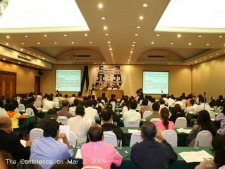Tai Members
Topics
By Suphasuk Pradubsuk (Posted: March 13, 2009)
The Rayong Provincial Administrative Court ruled on March 3, 2009 that the National Environment Board must announce Maptapud Industrial Estate and the surrounding areas as a pollution control zone within 60 days of the court’s order. The verdict followed a lawsuit filed against the National Environment Board by 27 Maptapud residents, who claimed that the National Environment Board (NEB) was negligent in not announcing the Maptapud Municipality and vicinity, heavily affected by serious environmental problems, as a pollution control zone in order to control, reduce and eliminate toxic waste, as directed in the Environment Act.
The Court considered the case following the reports of Pollution Control Department and related academic studies. All documents indicated the pollution levels in the area where the sprawling Maptapud Industrial Estate is located affects the quality of the environment and is dangerous to the health of its residents. In making this landmark decision, the court cited findings of the Pollution Control Department which showed that 40 volatile organic compounds have been detected in the air in the Maptapud areas with 20 of them carcinogenic and in amounts exceeding safety levels.
On the exact day of the court’s ruling, Thailand Environment Institute (TEI) and Thailand Environmental Governance Coalition (TAI Thailand) held a conference in Rayong Province to present results of the environmental governance assessment of the Petrochemical Industrial Development Master plan (Phase III), the Pollution Reduction and Mitigation Action Plan for Rayong Province and the Maptapud Town Plan and their recommendations. The assessment was carried out during 2007 and 2008 by using TAI indicator-based methodology to study three pillars of people’s access rights: 1) access to information; 2) participation in decision-making; and 3) access to justice.
The findings reveals that the government has continuously promoted heavy and petrochemical industries in the Maptapud area at the expense of the environment, coastal resources and the health of its residents. This promotion goes against Article 67 of Thailand Constitution (2007) which states that the right of a person to live in the environment which is not hazardous to his health, welfare or quality of life, shall be protected appropriately. The fact that the above three plans lacked meaningful public participation also shows that government agencies responsible for preparing the plans did not implement Principle 10 of the Rio Declaration.
Amidst pressure from the Federation of Thai Industry to have the National Environment Board appeal the Court’s ruling, on March 11, 2009 Thailand Environment Institute, the Thailand Environmental Governance Coalition, Thailand Council of Lawyers, Union for Civil Liberty, Social Research Institute, Chulalongkorn University and Society for Industrial Pollution Impacts Study and Campaign collectively submitted a Statement to the Prime Minister, members of the National Environment Board, Parliamentarian Committees, Industrial Estate Authority of Thailand, local governments, a few other relevant agencies and the media. The Statement proposes ten recommendations, including, among others, calling for the National Environment Board not to appeal to the Court’s ruling or permit any more new industry or expansion of existing industry in the area of question before industrial pollution in the area can be put under control and for the industrial estates to immediately set up a network of pollution information centers to proactively inform nearby residents and schools of any pollution leakage and how to protect themselves. The Statement also calls for environmental information to become public information according to Article 9 (8) of the Official Information Act (1997) and amendment of the following acts: Official Information Act (1997), Environmental Act (1992), Town and Country Planning Act (1975).
For more information, visit www.tei.or.th.

Comments are closed.